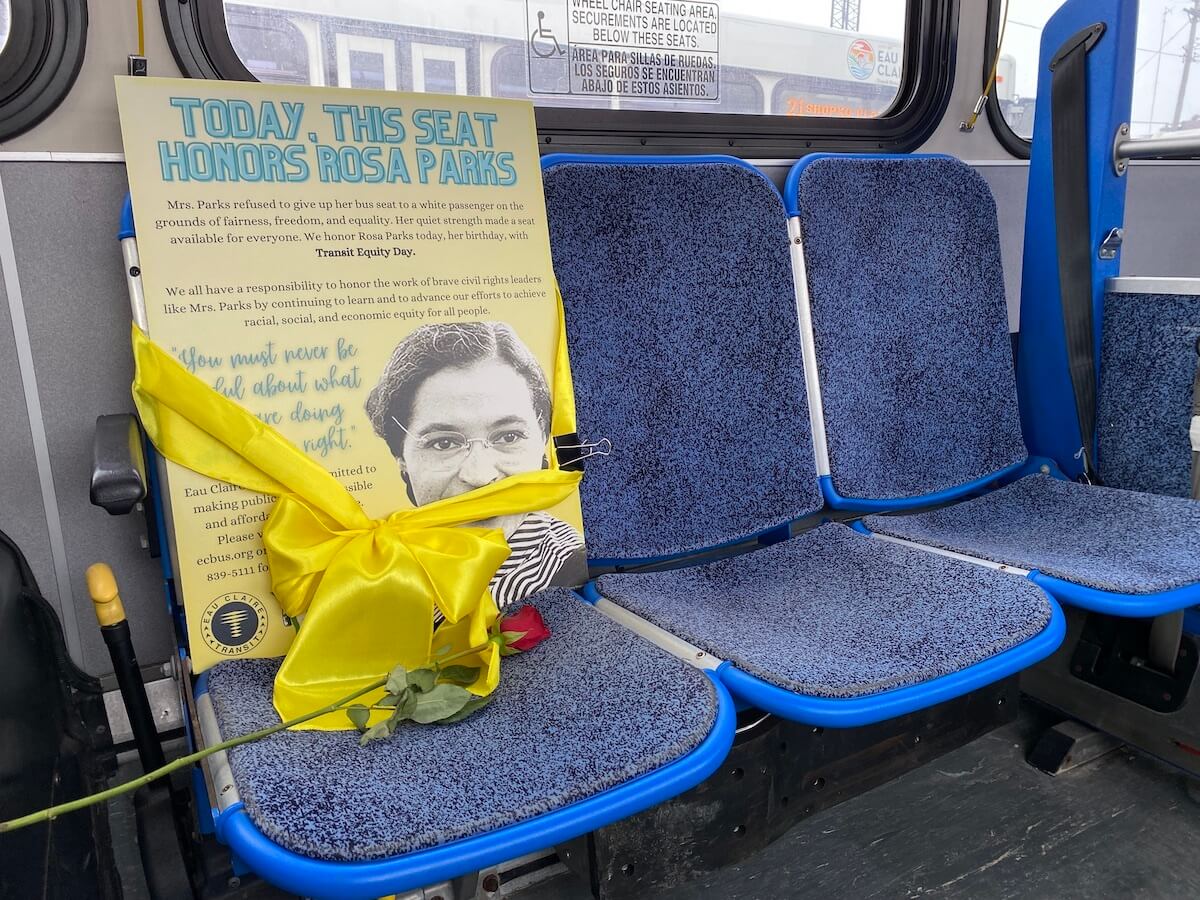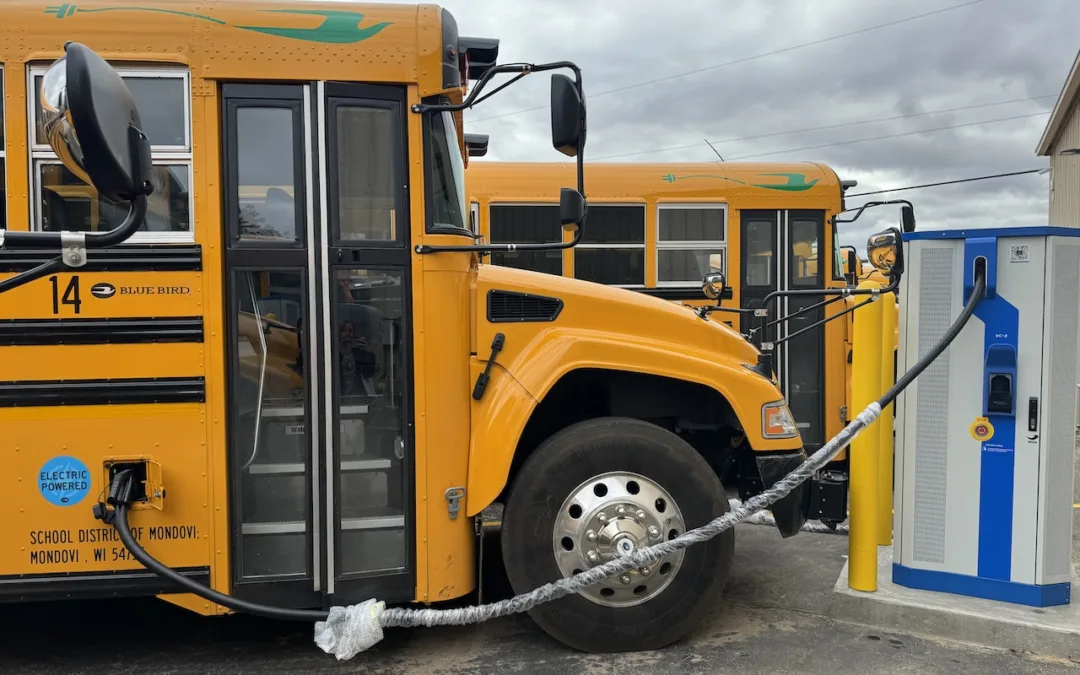
An Eau Claire bus seat "reserved" for Rosa Parks in honor of Transit Equity Day. (Photo by Julian Emerson)
Wisconsin transit agencies commemorate the civil rights icon on Transit Equity Day.
Bus riders in some cities across Wisconsin on Friday might notice something new on their trip: a seat adorned with a rose and reserved for Rosa Parks, the civil rights legend known for her role in desegregating buses.
Officials in Neenah, Menasha, Oshkosh, Appleton, Eau Claire, Madison, La Crosse, and Racine are commemorating Parks’ birthday for Transit Equity Day, and Gov. Tony Evers has made a statewide declaration for the occasion. At a Friday morning press conference, transit advocates and local officials said the day will help draw attention to the importance of improving public transportation to ensure all people, especially disadvantaged individuals, are able to fully participate in their communities.
“There’s a lot of red roses riding around our community this morning with below-zero temperatures, but, by God, I think it’s a good deal and a good way to recognize Rosa Parks and to recognize equity in our community,” said Paul Swanhorst, president emeritus of Amalgamated Transit Union Local 1310 in Eau Claire.
Parks, a Black woman, was best known for refusing to give up her seat for a white passenger on a Montgomery, Alabama bus at a time when people of color were forced to sit in the back of buses. She was arrested for her resistance, but her story set off a chain of events that led to federal courts ruling that racially segregating public buses was unconstitutional.
‘More and More Important’
While buses are no longer segregated, decreased funding, overlong routes, and poor planning have made public transportation unworkable for many people, said Cathy Van Maren, a transit advocate in La Crosse, which has been celebrating transit equity all week.
“We have areas including parks, polling places, elders housing, and workplaces where there is no bus service,” Van Maren said. “This is not the fault of the transit providers. It results in part from not prioritizing transportation and transit equity in planning, zoning, policies, and budgeting. But the good news is that that all can change.”
While Park’s refusal on Dec. 1, 1955, to vacate her seat on a city bus in Montgomery, Alabama so a white person could sit there provided a vital spark to the Civil Rights movement, today her action lives on as a symbol of the importance of public transit in highlighting socioeconomic and other societal inequities, people gathered to celebrate Transit Equity Day in Eau Claire said.
RELATED: Cities Are Making Public Transit More Environmentally Friendly
Today, Park’s action “recognizes seniors, people who rely upon mobility devices, and others who are visually, physically, or hearing impaired,” Eau Claire Community Services Director Renee Tyler said. “We are committed to supporting the independent movement and accessibility for all.”

Racine Mayor Cory Mason also paid respects to Corrine Reid-Owens, a Black woman and local civil rights leader dubbed “Racine’s Rosa Parks.” The city’s transit center is named after her.
“Corinne Reid-Owens, who is memorialized by the name of our historic Transit Center, was a leading figure in the civil rights movement, championing issues like fair housing and education locally,” Mason said in a statement. “Racine is a stronger community today because of leaders like Parks and Reid-Owens who had the bravery and determination to create change.”
Those commemorating Transit Equity Day also said improving public transportation is a major factor in fighting the climate crisis because mass transit produces less pollution than a fleet of cars transporting the same number of people.
“It’s becoming more and more important as we address climate change, and we are once again turning our attention to how public transit is going to be the movement of the future,” said Sen. Jeff Smith (D-Eau Claire), who introduced a Transit Equity Day resolution in the Legislature.
Gregg May, transit policy director with 1,000 Friends of Wisconsin, said improved public transit is needed now more than ever—and not just in urban areas. He pointed to recent findings from the Wisconsin Department of Transportation that rural areas are just as much impacted by poor public transit and that a third of Wisconsin’s population is considered “non-drivers.”
Jackie Pavelski, a former Eau Claire City Council member and a transit advocate, said rural areas around Eau Claire would benefit economically from a regional transit system. Those areas often struggle to attract jobs and people because of transportation challenges, she said.
“Providing transit access is not only important in places like Eau Claire, but in some of our smaller and rural communities as well,” Pavelski said. “Hopefully we can move in that direction going forward.”
Politics

Eric Hovde’s company exposed workers to dangerous chemicals, OSHA reports say
A Madison-based real estate company run by Wisconsin US Senate candidate Eric Hovde settled with the Occupational Safety and Health Administration...

Plugged in: How one Wisconsin school bus driver likes his new electric bus
Electric school buses are gradually being rolled out across the state. They’re still big and yellow, but they’re not loud and don’t smell like...
Local News

Stop and smell these native Wisconsin flowers this Earth Day
Spring has sprung — and here in Wisconsin, the signs are everywhere! From warmer weather and longer days to birds returning to your backyard trees....

Your guide to the 2024 Blue Ox Music Festival in Eau Claire
Eau Claire and art go hand in hand. The city is home to a multitude of sculptures, murals, and music events — including several annual showcases,...




